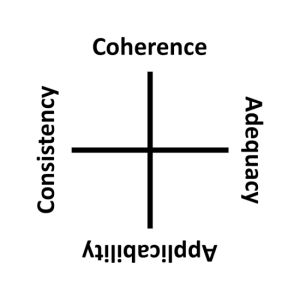
If one could divide all philosophies into four groups, what would those groups be? There doesn’t seem to be a strong consensus on how to do this although several have tried.
My first inclination is to start with the Archic Philosophers, discussed by Robert McKeon and his students Walter Watson and David Dilworth. These would be the Sophists, Plato, Democritus, and Aristotle. Philosophies aren’t usally divided in this way, but pros of doing this is that all four groups emerge from classical Greek thought. One of the main cons is that many would not agree that all philosophies are decendents of these four philosophers, or even combinations of aspects from each.
Another student of McKeon, Robert S. Brumbaugh, thought the process philosophies starting from those of Heraclitus and Anaxagoras (both pre-Socratic) and ranging through Whitehead should be represented instead of the Sophists. Otherwise he choose the same three as McKeon, giving Anaxagorean, Platonic, Democritean, and Aristotelian philosophies. By doing this he can form the double dual of Materialist-Formalist (direction) and Holoscopic-Meroscopic (method).
- Anaxagoras: Materialist, Holoscopic
- Platonic: Formalist, Holoscopic
- Democritean: Materialist, Meroscopic
- Aristotelian: Formalist, Meroscopic
Two works older than Brumbaugh’s that divide philosophy into the same four groups are those of Ralph Barton Perry and James Donald Butler. Their division is Naturalism, Idealism, Pragmatism, and Realism. I believe that the Realism in these books means Platonic Realism, instead of the more recent Scientific Realism thought of today. Of course Realism has many shadings as seen below.
It might be advantageous to consider Naturalism as a group instead of Realism, since the very concept of the real has so much disagreement. Naturalism does too, but not the extent that Realism does.
Several web sites divide four philosophies of eduction into Idealism, Realism, Pragmatism, and Existentialism. To me, Existentialism is similar to the Relativism of the Sophists. But what about Phenomenalism? Is that more like Relativism or Idealism?
There is also the monumental work “The Sociology of Philosophies” by Randall Collins but I haven’t examined it yet. I suspect they are not condensed or simplified into four groups.
So for now I’ve settled on Relativism, Idealism, Pragmatism, and Naturalism.
http://en.wikipedia.org/wiki/List_of_philosophies
http://en.wikipedia.org/wiki/Idealism
http://en.wikipedia.org/wiki/Relativism
http://en.wikipedia.org/wiki/Pragmatism
http://en.wikipedia.org/wiki/Philosophical_realism
http://en.wikipedia.org/wiki/Naturalism_%28philosophy%29
http://en.wikipedia.org/wiki/Aesthetic_Realism
http://en.wikipedia.org/wiki/Karen_Barad#Agential_Realism
http://en.wikipedia.org/wiki/Anti-realism
http://en.wikipedia.org/wiki/Critical_realism_%28philosophy_of_perception%29
http://en.wikipedia.org/wiki/Irrealism_%28philosophy%29
http://en.wikipedia.org/wiki/Moral_realism
http://en.wikipedia.org/wiki/Na%C3%AFve_realism
http://en.wikipedia.org/wiki/New_realism_%28philosophy%29
http://en.wikipedia.org/wiki/Platonic_realism
http://en.wikipedia.org/wiki/Surrealism
http://en.wikipedia.org/wiki/Actual_idealism
http://en.wikipedia.org/wiki/Absolute_idealism
http://en.wikipedia.org/wiki/German_idealism
http://en.wikipedia.org/wiki/Objective_idealism
http://en.wikipedia.org/wiki/Subjective_idealism
http://en.wikipedia.org/wiki/Transcendental_idealism
http://en.wikipedia.org/wiki/Metaphysical_naturalism
http://en.wikipedia.org/wiki/Spiritual_naturalism
http://en.wikipedia.org/wiki/Process_philosophy
http://en.wikipedia.org/wiki/Heraclitus
http://en.wikipedia.org/wiki/Anaxagoras
http://en.wikipedia.org/wiki/Pluralism_%28philosophy%29
http://edu402mariasblog.blogspot.com/2008/10/four-philosophies-of-education.html
Walter Watson / The Architectonics of Meaning: Foundations of the New Pluralism
David Dilworth / Philosophy in World Perspective: A Comparative Hermeneutic of the Major Theories
Robert S. Brumbaugh / Western Philosophic Systems and Their Cyclic Transformations
Ralph Barton Perry /Present Philosophical Tendencies: a critical survey of naturalism, idealism, pragmatism, and realism together with a synopsis of the philosophy of William James
James Donald Butler /Four Philosophies and Their Practice in Education and Religion
Randall Collins / The Sociology of Philosophies: a global theory of intellectual change
[*8.138, *8.151, *8.152]
<>
 Is everything four? Some try to prove it with a numerological trick. Take a word. Count its letters. Convert the number to words. Count letters. Repeat. Every English word seems to end up on four or 4, with nowhere else to go! Voila!
Is everything four? Some try to prove it with a numerological trick. Take a word. Count its letters. Convert the number to words. Count letters. Repeat. Every English word seems to end up on four or 4, with nowhere else to go! Voila!


